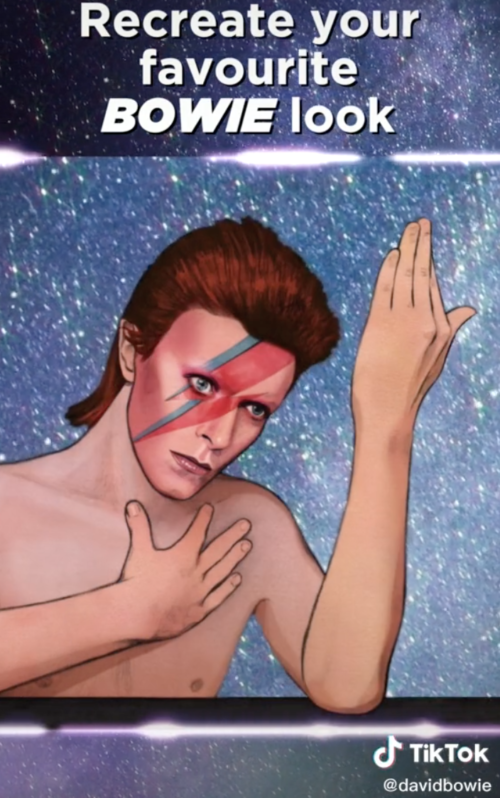In a series called Mondo Bullshittio, let’s talk about some of the most glaring hypocrisies and faux pas in pop culture… and all that it affects.
While it would seem Gen Z (a synonym for “K-pop fans” and “TikTok’ers,” as we learned in 2020) can only learn about pop culture history through TikTok, the latest bastardization of art in musical form is destined to take hold quite soon, as the Bowie oeuvre has been unleashed onto the app. Expectedly, it’s all of the greatest hits one would imagine, including “Modern Love,” “Heroes,” “Starman,” “Rebel Rebel” and “Under Pressure.” No need for deeper, more searing fare, like “I’m Afraid of Americans” or “Girl Loves Me.” That’s not very danceable, now is it?
Those who would try to flip the script and argue that there’s no harm in Bowie being introduced to this vacuous realm might say, “Oh the medium doesn’t matter so long as a new generation is exposed to Bowie.” Well, no actually. It fucking well matters that the manner in which Bowie is being presented is now in direct contrast to the sweeping visuals he once put forth in a lengthier format. He was not designed to be “ingested” in this ADD sort of way. He was meant to be absorbed and appreciated fully. Taken in like a long drink of water in a desert. Now, he’s just another “trend” to create an insipid dance to.
This feels more like an attack on his memory, rather than an honor to it, as Bowie’s entire life was spent living up to the lyrics that made him a “space oddity,” a creature with no compare. Someone who didn’t seek to pander to a zeitgeist, so much as the creator of a zeitgeist. This, one supposes, is the punishment for being a rebel and trailblazer. In the end, you get put on a t-shirt sold at Urban Outfitters (that’s a nod to Che Guevara). The things you were condemned and mocked for become the very things that are later commodifiable. A “trailer” unveiling how Bowie is now on TikTok adds further salt into the wound, as we catch our first glimpse of how his work will be pissed upon for the purposes of brevity. Of creating “slick edits” (that amount to a slideshow with some shitty additions of squiggles and other random flourishes that are not in the original videos).
Another of the few videos thus far added to the dead man’s new account is one urging users to re-create their favorite Bowie look–as though any one of these fuckers will be aware of much beyond the famed lightning bolt eye. Nor would they even want to attempt another one of his aesthetics anyway. Those in control of his Estate give license to the filth of a caption like, “To celebrate #TheStarman ’s life & arrival on TikTok, show us your recreations of his iconic looks throughout his career! #DavidBowie #Challenge”. Fucking disgusting. As if Bowie’s message and essence can be conveyed in this format, abbreviated into utter meaninglessness for the purposes of lesser androgynes to attempt virality.
Naturally, the ones who “knew and loved” Bowie would say he just wanted unity and peace (he was a real John Lennon sort, minus the flagrant cheating). That he would be delighted by having a TikTok account. Maybe (though that’s difficult to imagine of the man who spent his time among great minds and artists during his Berlin period). But there is nothing delightful about high art in pop culture (which is not an oxymoron when speaking of Bowie) being brought down from the celestial heavens for a degrading “purpose” such as this.
Bowie, long being an unofficial spokesman for angst-ridden youth, made it into John Hughes’ seminal teen movie The Breakfast Club via the words from “Changes” featured on a title card before the opening scene: “And these children that you spit on as they try to change their worlds are immune to your consultations. They’re quite aware of what they’re going through.” The truth is, it’s hard to have much “awareness” when everything you’re shown is pre-selected for you by an algorithm. When you’re part of a generation that spends its life in an alternate realm. Called TikTok. This ilk is not worthy (cue the video of Wayne and Garth here) of his music and legacy if they can’t even be bothered to seek it out for themselves. If they instead use his words and music to fulfill an ephemeral “craze.” It entirely negates what Paul Morley, the critic and author who wrote The Age of Bowie in 2016, stated with regard to what Bowie taught us all: “the importance of distinctive, disobedient imaginative action.”






















